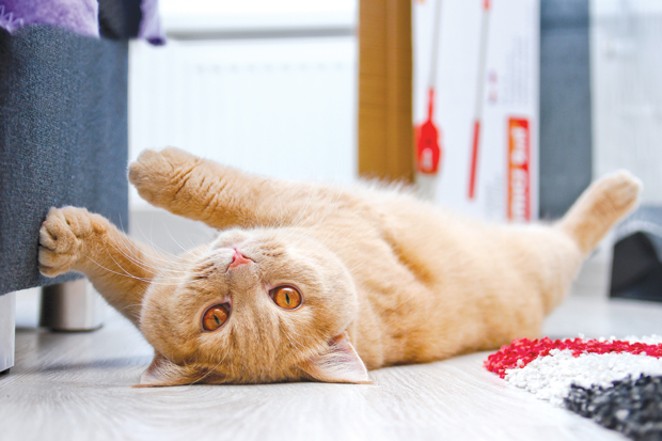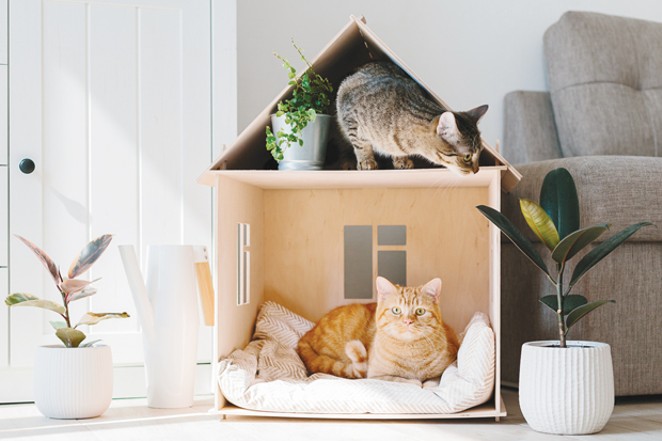Dogs get a lot of attention in a town like Bend, dubbed a "Dog Town USA," but as cat lovers know, cats can offer their fair share of love and Instagram-worthy photos. At Feline Fine Cat Clinic in Bend, veterinarians including owner Stephanie Kadasi, DVM, focus solely on the feline side of animal care.
We checked in with Kadasi to answer some of our most pressing cat-related questions.
Source Weekly: I got a cat during the pandemic and now I'm headed back to work. What can I do to ensure my kitty doesn't get bored when I am gone?
Stephanie Kadasi: Cats love to get their energy and entertainment out in short bursts of energy, and then to sleep in between the excitement. (What a life!) If your schedule allows, set aside about 20-30 minutes of attention and play time with your cat before and after your work shifts. I personally love the "Cat Dancer" (can be found on amazon.com), which many cats love as it mimics the movements of a flying bug. If your cat munches on some dry food during the day, Doc and Phoebe's Cat Co Indoor Hunting Cat Feeder Kit is a good way to give your kitty some exercise and mental stimulation while looking for their meal. While out of the home, consider playing "Cat TV" (from youtube.com) on a screen, or better yet if your home can accommodate one, have a catio built that allows safe access to outdoor fresh air and nature's entertainment of critter watching (Elwing Works, LLC, a local small business, makes some beautiful kitty structures!). Most cats highly benefit from cat climbers, cat shelves and various wall structures that enable them to climb up high, and some love an exercise wheel (such as the one made by "One Fast Cat"). Otherwise, remember that cats do like to sleep a LOT, so they are probably less bored than you think. Consider having a kitty cam placed in your home so that you can check out their daily habits (and even talk to them through a microphone!)
SW: My new cat is very afraid of our dog, and the dog isn't sure about her, either. What can I do to ensure they integrate together safely?
SK: The first step is accepting that some cats and dogs may only get to the point of tolerating each other, especially from the cat's perspective, and that's OK! Our goal is to keep the environment safe and as stress-free as possible. Offer plenty of climbing spaces over 5 feet tall for your kitty to feel that they can "get away" when needed. Consider using Feliway diffusers, which provide calming hormones for your cat, and some cats (and dogs) may benefit from anxiety supplements and medications, which can be prescribed by your veterinarian. Make sure their feeding places are away from each other, preferably in separate rooms and consider placing your cat's food up higher out of the dog's reach, and that the litter box is in a safe and quiet location away from the dog. Offer treats when your cat and dog are in the same space, to help form a positive emotional relationship between each other's presence.
SW: My old cat gets a mix of wet food and dry food to help him eat with his bad teeth. My young cat seems to think he needs that, too. What's the best way to handle this?
SK: Interestingly, dry food is not shown to help kitty teeth any more than wet food. For one, many cats swallow their food mostly whole, and for two, as soon as they bite into the dry food, it gets mushed up with saliva, sticking to teeth similarly to wet food. The only dry food shown to help reduce dental tartar is a prescription veterinary dental diet, but because most cats don't really "chew" their food more than a bite or two, it is often not particularly effective. The American Association of Feline Practitioners currently recommends cats be on a completely wet-food diet, and if that is not possible, aim for at least 50% of their diet to come from wet food rather than dry food alone. This may help reduce the development of urinary crystals and kidney disease. There are some water additives and other products that can help reduce plaque formation over time (look for a "VOHC" seal of approval from the board of veterinary dentists on the packaging), however in general the only way to truly effectively maintain a healthy disease-free kitty mouth is through regular CORE (Comprehensive Oral Radiographs and Examination) dentals and cleanings under anesthesia by your veterinarian, ideally on a yearly basis once a kitty has reached adulthood.
SW: What's your take on letting kitty outside to roam, as she wants to do? A bell on her collar? Any other ideas for keeping both cats and other wildlife safe?
SK: Typically, I recommend that cats stay indoors, both for their own safety and for wildlife conservation measures. If you live in an area without heavy traffic, and if your cat adamantly refuses to stay inside, there will be inherent risks to their outdoor lifestyle. Some of these risks, such as infectious diseases like Feline Distemper, Rabies and Feline Leukemia Virus, can be effectively vaccinated against by your veterinarian. Other diseases, such as Feline Immunodeficiency Virus, do not currently have an effective vaccine. Outdoor cats are also exposed to all kinds of internal and external parasites, such as tapeworms, fleas, etc., which can be protected against with safe parasite preventatives from your veterinarian. Non-infectious risks include coming across larger predatory animals, such as coyotes, birds of prey and wild cats. It is also very important to make sure an outdoor cat (and even indoor cats) are spayed and neutered, so that they don't have accidental litters of kittens, as well as to reduce the chances of them fighting with other outdoor cats.
Additional recommendations include making sure your pet wears a break-away collar with up to date ID information, and having a microchip placed. There are some tracking devices that send information to an app on your cell phone, if you would like to keep an eye on where your kitty is roaming, which is helpful during unexpected disappearances of your pet. A bell on the collar may help alert wildlife to your cat's presence, to help give birds and other critters a chance to escape your kitty's hunt safely.
SW: We just moved to Central Oregon and the air is drier than my cat is used to. How can I help her with her dry skin?
SK: Humidifiers are your friend! Place one along with an air purifier in at least the room where your cat sleeps most often, and make sure to keep these machines clean to prevent mold growth. Consider having your cat hang out in your bathroom while you take a shower or bath. Otherwise, certain skin supplements and treatments can be provided by your veterinarian, if the above measures are not quite enough to solve the problem.



























